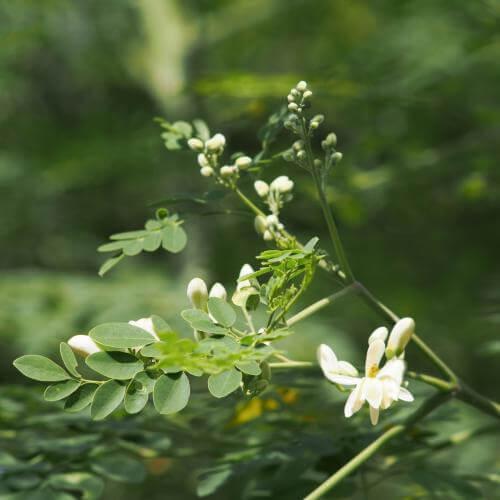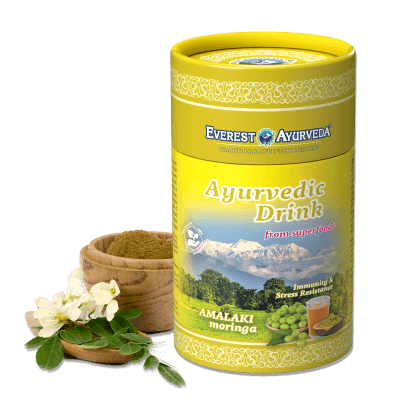
Moringa, in Latin Moringa Oleifera, is a slender tree growing at the foot of the Himalayas of the moringa family. It is now growing throughout the Indian subcontinent, Arabia, Africa and Madagascar, but is already grown in noble form all over the world.
Moringa grows up to 12 m high and is characterized by its approximately 30 cm long lattes of flowers and pod-shaped capsules with highly oily seeds. In some place, it is also called "horseradish tree" or "stick tree".
Moringa As a Universal Cure-All
Moringa is described by many cultures as a universal "cure-all". For its beneficial effects, it is and was known not only in Ayurveda, but also in ancient Egypt and later in ancient Greece and Rome. In Africa, it is nicknamed the "tree of miracles". In the modern world, it is classified as a so-called "superfoods", which are characterized by their high content of nutrients, vitamins, minerals, enzymes and antioxidants.
The all-round use of moringa is mainly associated with the Indian subcontinent and Africa, where its leaves, which are part of the normal diet and are added to salads, soups and sauces, are processed. The leaves are rich in many minerals such as potassium, phosphorus, calcium, manganese, magnesium, zinc and iron, vitamins such as beta-carotene, riboflavin, biotin, folic acid and ascorbic acid, omega 3 and 6 unsaturated acids and proteins. Fruits in the form of green pods are then used mainly in India. The seeds of the moringa are then roasted and taste like nuts.
Ayurveda and traditional folk medicine use almost all parts of this tree to treat up to 300 different types of diseases. Leaves and juice from the leaves are mainly used to healing the eyes in mechanical damage, allergies, asthma, problems with bloating, anti-aging manifestations, high pressure, blood loss, bronchitis, cholera, colitis, diabetes, diarrhea, inflammation, initial bone pathologies and headaches. The roots are used for digestive disorders, pain control, parasites and seeds have a mainly anti-inflammatory effect and reduce fever.
Traditional healers from Southeast Asia also use moringa to treat rheumatism, nervousness, tubercolosis, hearing disorders, viral infections, constipation and blindness. Flowers are then used as an encouraging tool for students to promote alertness, better concentration, balance and stimulation to physical activity and weight loss.
Expert studies have shown that moringa extract has a very positive effect against free radicals in the body and acts as a powerful antioxidant against aging of the body. Furthermore, a significant decrease in blood sugar levels has been shown, as well as a decrease in lipids in plasma.
What Are the Options to Get Moringa?
And in what form can you get moringa? Most of the time you will come across it in the form of powder, capsules or dried leaves, even seeds can be obtained, but this is a challenge for real gardeners. You can try our unique combination of Amla with Moringa to strengthen immunity and increase stress resistance in the form of pure ground powder in RAW quality, which you can then easily pour over with hot water, make the taste more pleasant with honey, or add to smoothies, juices or porridges.

 100 g
100 g